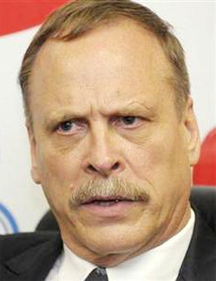RIO DE JANEIRO, (Reuters) – International sports federations need to set up an independent organisation along the lines the World Anti-Doping Agency (WADA) to combat match-fixing, former FIFA security chief Chris Eaton has said.

Eaton, an ex-Interpol officer who is now working with the non-profit Qatar-based International Centre of Sports Security (ICSS), believes more needs to be done in the way of criminal intelligence to stop match-fixers before they strike.
“You need very good intelligence and that is what sport has not really invested in,” the Australian told Reuters at the Soccerex conference in Rio de Janeiro.
“We have to focus on prevention, not just prevention by rules and regulations, but sport-related investigation under the auspices of an independent organisation with some sort of global funding apparatus, a bit like WADA except that it needs to be an intelligence organisation.
“It needs to be pan-sports and it needs to be global.”
Eaton, who thinks mechanisms should be set up to halt matches while they are in progress if there are firm indications of manipulation, fears his suggestion for a world anti-match-fixing body may fall on deaf ears.
“I think it should be done as soon as possible although I’m worried that it won’t be because the issue is who is going to pay for this?” he added.
“That was what stalled WADA for a long time, everyone realised that doping was a big problem in sport but it took years to create WADA and only happened after governments agreed for a global conference to put some money into it.”
Eaton said that even within certain sports, there was disagreement over who was responsible for fighting match-fixing.
“It’s about avoiding paying for it, because there’s a significant cost to doing these things and ultimately they will have to do it anyway, so my suggestion is that the earlier they invest in this, the least it will cost them,” he remarked.
ILLEGAL GAMBLING
Match-fixing is often organised by illegal gambling rings who make millions of dollars by betting on the result of the games they have manipulated.
Eaton, who left his job at world soccer’s governing body FIFA in February, said that gangs could influence matches in various sports by bribing players, referees or administrators.
One of the most common involved bets that five goals or more would be scored in a game.





